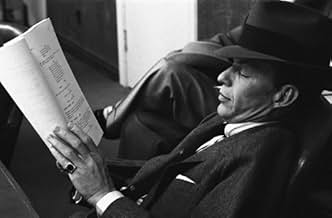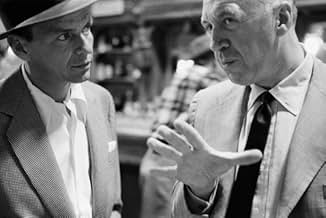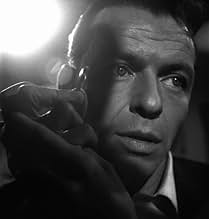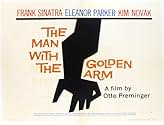VALUTAZIONE IMDb
7,3/10
12.948
LA TUA VALUTAZIONE
Un tossico deve affrontare la sua vera identità per combattere la sua dipendenza.Un tossico deve affrontare la sua vera identità per combattere la sua dipendenza.Un tossico deve affrontare la sua vera identità per combattere la sua dipendenza.
- Regia
- Sceneggiatura
- Star
- Candidato a 3 Oscar
- 3 vittorie e 8 candidature totali
Jered Barclay
- Junkie in Lock-Up
- (non citato nei titoli originali)
Leonard Bremen
- Cabbie in Lock-Up
- (non citato nei titoli originali)
Paul E. Burns
- Suspenders in Lock-Up
- (non citato nei titoli originali)
Pete Candoli
- Jazz Musician
- (non citato nei titoli originali)
Herschel Graham
- Club Safari Patron
- (non citato nei titoli originali)
Harold 'Tommy' Hart
- Officer Kvorka
- (non citato nei titoli originali)
Recensioni in evidenza
Sinatra is thoroughly convincing as the addict in this grim horror story of what life is like for someone who has lost his soul to drugs. This is film noir made even more noir by the drab sets and lighting. We go through the terrifying experience of a man who is trying to escape from the monster he has placed on his own back.
Elmer Bernstein's score is a mixture of jazz and symphony that makes the addict's frightful journey even more believable to the audience.
This film opened the topic of drug addiction the way LOST WEEKEND broached the subject of alcoholism. At least people could talk about these addictions a little more freely.
Elmer Bernstein's score is a mixture of jazz and symphony that makes the addict's frightful journey even more believable to the audience.
This film opened the topic of drug addiction the way LOST WEEKEND broached the subject of alcoholism. At least people could talk about these addictions a little more freely.
The Man With a Golden Arm was one of a trio of great films around that same time that dealt with drug addiction. The other two were Monkey On My Back and A Hatful of Rain. But I think of the three this one is the best.
Maybe if Otto Preminger had shot the thing in the real Chicago instead of those obvious studio sets the film might have been better yet. Who knows, maybe Preminger couldn't get enough money to pay for the location. It's the only flaw I find in the film.
Frank Sinatra is a heroin addicted card dealer who was busted for covering for his boss Robert Strauss when the game was raided. He took the cure while in jail and wants a new life as a jazz drummer. But a whole lot of people are conspiring against him.
First Bob Strauss who wants him back dealing, especially because a couple of heavyweight gamblers are in town. He uses a few underhanded methods to get Sinatra's services back. Secondly Darren McGavin is the local dope dealer who wants Sinatra good and hooked as a customer again. And finally Eleanor Parker his clinging wife who's working a con game to beat all, just to keep him around.
Frank Sinatra got a nomination for Best Actor for this film, but lost to Ernest Borgnine in Marty. Sinatra might have won for this one if he hadn't won for From Here to Eternity in the Supporting Actor category a few years back and that Marty was such an acclaimed film in that year. His scenes going through withdrawal locked up in Kim Novak's apartment will leave you shaken.
Eleanor Parker does not get enough credit for her role. She's really something as the crazy scheming wife who wants Sinatra tied to her no matter what the cost. If she had not been nominated that same year for Interrupted Melody, she might have been nominated for this. 1955 marked the high point of her career.
Darren McGavin got his first real notice as the very serpentine drug peddler. His performance is guaranteed to make your flesh crawl.
Elmer Bernstein contributed a great jazz score to accentuate the general dinginess of the bleak Chicago neighborhood the characters live in. Not a place you'd want to bring up your family.
Maybe if Otto Preminger had shot the thing in the real Chicago instead of those obvious studio sets the film might have been better yet. Who knows, maybe Preminger couldn't get enough money to pay for the location. It's the only flaw I find in the film.
Frank Sinatra is a heroin addicted card dealer who was busted for covering for his boss Robert Strauss when the game was raided. He took the cure while in jail and wants a new life as a jazz drummer. But a whole lot of people are conspiring against him.
First Bob Strauss who wants him back dealing, especially because a couple of heavyweight gamblers are in town. He uses a few underhanded methods to get Sinatra's services back. Secondly Darren McGavin is the local dope dealer who wants Sinatra good and hooked as a customer again. And finally Eleanor Parker his clinging wife who's working a con game to beat all, just to keep him around.
Frank Sinatra got a nomination for Best Actor for this film, but lost to Ernest Borgnine in Marty. Sinatra might have won for this one if he hadn't won for From Here to Eternity in the Supporting Actor category a few years back and that Marty was such an acclaimed film in that year. His scenes going through withdrawal locked up in Kim Novak's apartment will leave you shaken.
Eleanor Parker does not get enough credit for her role. She's really something as the crazy scheming wife who wants Sinatra tied to her no matter what the cost. If she had not been nominated that same year for Interrupted Melody, she might have been nominated for this. 1955 marked the high point of her career.
Darren McGavin got his first real notice as the very serpentine drug peddler. His performance is guaranteed to make your flesh crawl.
Elmer Bernstein contributed a great jazz score to accentuate the general dinginess of the bleak Chicago neighborhood the characters live in. Not a place you'd want to bring up your family.
I loved that this movie takes place on an imaginary block of an imaginary city. You could say the streets represents a state of mind just like the title of
Chinatown did two decades later. Here degeneracy and addiction are the
norm. This place sucks you in and wont let go. It's here that Sinatra must face his demons when he returns home after getting clean at a rehab clinic. The film ends up being just as much about moving on from the past as it does about drug addiction.
Sinatra's junky is a bit amorphous, we never really learn whether he grew up here or what led him to his addictions. However, the story is strong and told with a nice brisk pace. There are some real memorable moments (the Gambling
sequence, Frankie coming off smack, etc). Preminger's direction is great, some subtle camera work adds a lot to a number of scenes. Elmer Berstein's score
and Saul Bass' titles perfectly set the mood. Overall, an endearing film you should check out.
Chinatown did two decades later. Here degeneracy and addiction are the
norm. This place sucks you in and wont let go. It's here that Sinatra must face his demons when he returns home after getting clean at a rehab clinic. The film ends up being just as much about moving on from the past as it does about drug addiction.
Sinatra's junky is a bit amorphous, we never really learn whether he grew up here or what led him to his addictions. However, the story is strong and told with a nice brisk pace. There are some real memorable moments (the Gambling
sequence, Frankie coming off smack, etc). Preminger's direction is great, some subtle camera work adds a lot to a number of scenes. Elmer Berstein's score
and Saul Bass' titles perfectly set the mood. Overall, an endearing film you should check out.
A solid drama to begin with, "The Man With the Golden Arm" is particularly worthwhile for Frank Sinatra's performance as Frankie Machine. The movie was well-conceived, and it would probably have been worth seeing with any decent lead, but Sinatra makes it even better. The story is interesting and at times compelling, as Frankie struggles against himself and his circumstances.
The story is told from the viewpoint of its era, yet the basic elements are timeless enough that the story still holds up very well. The details of Frankie's situation are less important than the general themes of him battling his own desires while also contending against "friends" who simply want to use him for their own purposes.
Sinatra was good at this kind of role, as a character with his own inner demons who must also face hostile surroundings. He channels his nervous energy into expressions and gestures that convey well what is going on inside him. The actor Sinatra deserves to be remembered for roles like this one and his roles in "The Manchurian Candidate" and "From Here to Eternity", rather than for the insubstantial 'Rat Pack' features.
The supporting cast have simpler roles, but they do their jobs satisfactorily. The story moves at a good pace, and it is complemented by an Elmer Bernstein score which, though sometimes jarring, is appropriate. The combination works well as a whole.
The story is told from the viewpoint of its era, yet the basic elements are timeless enough that the story still holds up very well. The details of Frankie's situation are less important than the general themes of him battling his own desires while also contending against "friends" who simply want to use him for their own purposes.
Sinatra was good at this kind of role, as a character with his own inner demons who must also face hostile surroundings. He channels his nervous energy into expressions and gestures that convey well what is going on inside him. The actor Sinatra deserves to be remembered for roles like this one and his roles in "The Manchurian Candidate" and "From Here to Eternity", rather than for the insubstantial 'Rat Pack' features.
The supporting cast have simpler roles, but they do their jobs satisfactorily. The story moves at a good pace, and it is complemented by an Elmer Bernstein score which, though sometimes jarring, is appropriate. The combination works well as a whole.
I am willling to BET very few of You have seen this amazing mid-50´s CLASSIC! I am particularly anxious to share my impressions and thoughts about it with You readers....
Those of You who remember seeing Frank Sinatra in this film at a movie theater during the first year of its release surely must be in Your 80´s or 90´s... How did I manage to see it thusly when I am now ONLY 75?¿? I will share that with You in a moment....
....But FIRST: Let us FOCUS on the Title's CONTENT and CONTEXT:
If you're under 80, there's probably no way you can remember how controversial and cutting edge MAN WITH The GOLDEN ARM was when it was released in 1955! Fortunately for me, my parents were very liberal in permitting me to see films and even took me to see it just after turning Eight.
WOW! What a tremendous impact it had on me. It was the first "Grown-up" film that clearly made me realize there was more to cinema than just Sci-Fi/Horror, Westerns and Kids' movies!
Mainstream cinema had NEVER touched the subjects of drug addiction and heroin withdrawal, which were considered taboo topics, even at the dinner table, let alone as the focus of a movie to be shown in public! The MPAA (Motion Picture Association of America) refused to give its seal of approval to GOLDEN ARM, forcing Producer/Director Otto Preminger and Distributor United Artists to release it without the MPAA's seal. This decision, of course, contributed greatly to both the films commercial and critical success! It also opened the door to new ways of making, distributing and classifying films.
Before my recent third viewing, I had only seen it once at age 8, mentioned above, and again, in my late teens (Perhaps the 10th Anniversary Re-Release?). Despite some of the production elements and dialog that do date the film considerably, the last half of GOLDEN ARM had me in a virtual headlock!
The acting, Bernstein music, photography and editing all contribute to the mood of the movie, precisely as Otto Preminger intended! The scene where Machine (Sinatra) undergoes withdrawal pains is still unbelievably hard-hitting today.
In general, Sinatra's performance is quite surprising. His Oscar nomination was very well deserved. When you consider this performance in conjunction with Sinatra's role in MANCHURIAN CANDIDATE and FROM HERE to ETERNITY, you begin to appreciate just how underrated OLD BLUE EYES was as an ACTOR! 9* STARS*
..... ENJOY! / DISFRUTELA!
Any comments, questions or observations, in English o en ESPAÑOL,, are most welcome!
Those of You who remember seeing Frank Sinatra in this film at a movie theater during the first year of its release surely must be in Your 80´s or 90´s... How did I manage to see it thusly when I am now ONLY 75?¿? I will share that with You in a moment....
....But FIRST: Let us FOCUS on the Title's CONTENT and CONTEXT:
If you're under 80, there's probably no way you can remember how controversial and cutting edge MAN WITH The GOLDEN ARM was when it was released in 1955! Fortunately for me, my parents were very liberal in permitting me to see films and even took me to see it just after turning Eight.
WOW! What a tremendous impact it had on me. It was the first "Grown-up" film that clearly made me realize there was more to cinema than just Sci-Fi/Horror, Westerns and Kids' movies!
Mainstream cinema had NEVER touched the subjects of drug addiction and heroin withdrawal, which were considered taboo topics, even at the dinner table, let alone as the focus of a movie to be shown in public! The MPAA (Motion Picture Association of America) refused to give its seal of approval to GOLDEN ARM, forcing Producer/Director Otto Preminger and Distributor United Artists to release it without the MPAA's seal. This decision, of course, contributed greatly to both the films commercial and critical success! It also opened the door to new ways of making, distributing and classifying films.
Before my recent third viewing, I had only seen it once at age 8, mentioned above, and again, in my late teens (Perhaps the 10th Anniversary Re-Release?). Despite some of the production elements and dialog that do date the film considerably, the last half of GOLDEN ARM had me in a virtual headlock!
The acting, Bernstein music, photography and editing all contribute to the mood of the movie, precisely as Otto Preminger intended! The scene where Machine (Sinatra) undergoes withdrawal pains is still unbelievably hard-hitting today.
In general, Sinatra's performance is quite surprising. His Oscar nomination was very well deserved. When you consider this performance in conjunction with Sinatra's role in MANCHURIAN CANDIDATE and FROM HERE to ETERNITY, you begin to appreciate just how underrated OLD BLUE EYES was as an ACTOR! 9* STARS*
..... ENJOY! / DISFRUTELA!
Any comments, questions or observations, in English o en ESPAÑOL,, are most welcome!
Lo sapevi?
- QuizFrank Sinatra jumped at a chance to star in the film before reading the entire script.
- BlooperIn a scene about twenty minutes in, as the camera exits the bar following Frankie, the jukebox can be seen to slide out of the way of the camera at the bottom of the screen.
- ConnessioniEdited into Bass on Titles (1982)
I più visti
Accedi per valutare e creare un elenco di titoli salvati per ottenere consigli personalizzati
- How long is The Man with the Golden Arm?Powered by Alexa
Dettagli
- Data di uscita
- Paese di origine
- Lingue
- Celebre anche come
- El hombre del brazo de oro
- Luoghi delle riprese
- Azienda produttrice
- Vedi altri crediti dell’azienda su IMDbPro
Botteghino
- Budget
- 1.000.000 USD (previsto)
- Lordo in tutto il mondo
- 4652 USD
- Tempo di esecuzione
- 1h 59min(119 min)
- Colore
- Proporzioni
- 1.85 : 1
Contribuisci a questa pagina
Suggerisci una modifica o aggiungi i contenuti mancanti




































